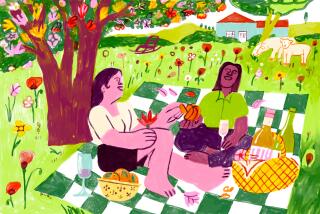French Oak for BV Private Reserve?
- Share via
Beaulieu Vineyard’s George de Latour Private Reserve Cabernet Sauvignon is one of California’s legendary wines, a wine with a heritage dating back a half century, a wine for which Andre Tchelistcheff gained his greatest fame.
It has traditionally been aged in American oak barrels, a technique out of favor with the vast majority of California winemakers today, who prefer to use French oak barrels.
In a series of interviews, Tchelistcheff said that if he could do it over again, he would use French oak barrels too. He said he liked the complex elements one gets from them.
“But you’ve got to understand, we couldn’t use them,” he said.
He said that when he arrived at Beaulieu in 1938, barrels had already been purchased. And by 1940, when he was ready to buy French oak barrels, World War II was already raging in Europe and such barrels were unavailable.
“After the war, in 1947, we wanted to buy French oak, but we had the fire.” A major fire devastated the winery and insurance covered only part of the loss; the owner, Madame Fernande de Latour, dipped into her personal savings to rebuild, “so we had no money for the French oak.”
By 1952, when the winery was back to a stable financial condition, “it was too late,” he said. “The style of the wine was set, we couldn’t change.”
Joel Aiken, winemaker at BV today, said Tchelistcheff’s return has meant a re-opening of the discussion of French oak.
“We are experimenting with some French oak,” he said. “Nothing has been decided yet.”
He said there was no intention to change BV Private Reserve, but said he and Tchelistcheff have tasted various wines aged in French oak and soon would decide if the wine could be made with some wine aged in French oak blended in.
Tchelistcheff also revealed that BV would, in 1992, release a Merlot--never made before at BV--that was aged entirely in French oak. The wine will be called Madame de Latour, in honor of the former proprietor.
A spokesman for the winery said the wine must be approved by Tchelistcheff before it is released. “This wine will meet his high standards or it won’t be released.”
Tchelistcheff said he was upset over the way many wines are being made in California today.
“Wine doesn’t speak of the grape any more,” he said, adding that too many wines are made from over-ripe grapes. “I still defend freshness and acidity rather than over-maturity. And all this tremendous alcohol, 13.5%, 13.8%, it’s unbelievable. Wine should be lower.”
He also opposes wines that are aged in oak so long as they taste of the oak itself.
“I am an opponent of the use of barrels. Nobody likes to accept the idea, but in the wine industry we became slaves of wood, and as long as it’s accepted, we’ll continue to do such errors--except certain exceptional individuals who understand the important factor: Give it the wood, but do not allow wood to be a character in the wine.
“I am a fighter, almost a fist-fighter, against the oak. . . . Killing the fruit with alcohol or wood is a great error.
“I like the wines of Washington, such as Columbia Crest. (Winemaker) Doug Gore is doing a good job. He used to be with (Myron) Nightingale (the late Beringer winemaker). Years ago in Napa it was just me and Nightingale, and Louis Martini, we built the wines.
“The tragedy of us today is that people are guided by big ideas, big dreams, big images, but nobody wants to do fundamental works in winemaking. Winemakers are not living with the vines any more. They are in offices.
“But wines are not created by an individual, they are created by a team of workers, a team that includes the grower, that includes the man in charge of crush, the man in charge of barrel washing, every little detail. And it’s an unbelievable thing that we completely disregard the team.
“Biggest problem: Thousands and thousands of barrels cannot make fine wine.”
Tchelistcheff sat back in a large high-back chair that made him seem even smaller. He sighed, then leaned forward, fire glowing in his eyes.
“For me, it’s sad; winemakers today, they make too much wine here (he pointed to his head) and not enough wine here (he pointed to his heart).”
Then he added, almost as a final paragraph: “My life is wine and the vineyard. It’s a life.”
More to Read
Eat your way across L.A.
Get our weekly Tasting Notes newsletter for reviews, news and more.
You may occasionally receive promotional content from the Los Angeles Times.







